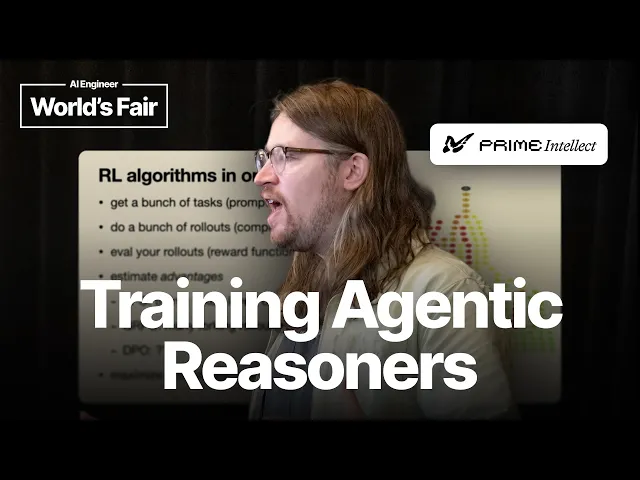Training Agentic Reasoners — Will Brown, Prime Intellect

AI agents are now teaching themselves
In a move that feels straight out of a sci-fi premise, we're witnessing a crucial shift in artificial intelligence development. Prime Intellect's Will Brown has revealed a fascinating approach to creating AI systems that can genuinely reason and solve complex problems through self-training mechanisms. Rather than the usual method of force-feeding mountains of data to models, this new paradigm lets AI systems essentially teach themselves through exploration and reflection.
Key developments worth your attention
-
The technique creates AI agents that learn through a trial-and-error process called "exploration and exploitation," similar to how humans learn by testing different approaches and refining based on outcomes.
-
These systems use a recursive training approach where the AI critiques its own reasoning, identifies flaws, and improves—essentially becoming both student and teacher.
-
The process involves careful "calibration" to ensure the AI knows when it's confident versus uncertain, preventing the overconfidence that plagues many current AI systems.
Why this matters more than you might think
The most profound insight from Brown's work is the shift from brute-force training to recursive self-improvement. Traditional language models like GPT-4 achieve impressive results through massive parameter counts and training data, but they don't truly understand what they're doing. They're pattern-matching machines without genuine comprehension.
This approach represents a fundamental rethinking of AI development that could solve the "reasoning gap" that has limited practical applications. Current AI systems often give confident-sounding but incorrect answers because they have no mechanism to verify their own logic. An AI that can critique itself, identify false assumptions, and iterate toward better reasoning could be trusted with increasingly complex decision-making tasks—from medical diagnostics to financial planning.
The business implications are substantial. Companies currently face a trust barrier with AI deployment—employees and customers remain skeptical of AI recommendations because of their unpredictable errors. Self-calibrating, reasoning-focused AI could finally bridge this gap, making automation feasible for knowledge work that still requires human oversight.
Where this fits in the broader AI landscape
What's particularly interesting is how this approach contrasts with the "scale is all you need" philosophy that has dominated AI research for years. Companies like OpenAI and Anthropic have pursued ever-larger models trained on ever-more data, but they're
Recent Videos
How To Earn MONEY With Images (No Bullsh*t)
Smart earnings from your image collection In today's digital economy, passive income streams have become increasingly accessible to creators with various skill sets. A recent YouTube video cuts through the hype to explore legitimate ways photographers, designers, and even casual smartphone users can monetize their image collections. The strategies outlined don't rely on unrealistic promises or complicated schemes—instead, they focus on established marketplaces with proven revenue potential for image creators. Key Points Stock photography platforms like Shutterstock, Adobe Stock, and Getty Images remain viable income sources when you understand their specific requirements and optimize your submissions accordingly. Specialized marketplaces focusing...
Oct 3, 2025New SHAPE SHIFTING AI Robot Is Freaking People Out
Liquid robots will change everything In the quiet labs of Carnegie Mellon University, scientists have created something that feels plucked from science fiction—a magnetic slime robot that can transform between liquid and solid states, slipping through tight spaces before reassembling on the other side. This technology, showcased in a recent YouTube video, represents a significant leap beyond traditional robotics into a realm where machines mimic not just animal movements, but their fundamental physical properties. While the internet might be buzzing with dystopian concerns about "shape-shifting terminators," the reality offers far more promising applications that could revolutionize medicine, rescue operations, and...
Oct 3, 2025How To Do Homeless AI Tiktok Trend (Tiktok Homeless AI Tutorial)
AI homeless trend raises ethical concerns In an era where social media trends evolve faster than we can comprehend them, TikTok's "homeless AI" trend has sparked both creative engagement and serious ethical questions. The trend, which involves using AI to transform ordinary photos into images depicting homelessness, has rapidly gained traction across the platform, with creators eagerly jumping on board to showcase their digital transformations. While the technical process is relatively straightforward, the implications of digitally "becoming homeless" for entertainment deserve careful consideration. The video tutorial provides a step-by-step guide on creating these AI-generated images, explaining how users can transform...
